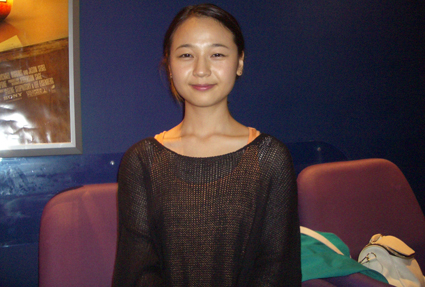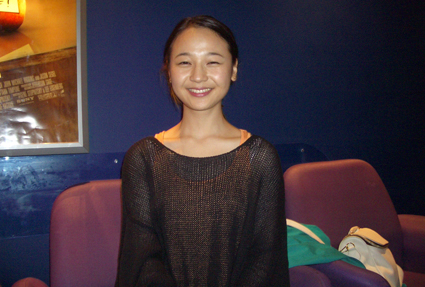
 |
||
|
||
Hangul Celluloid: 'Breathless’ is probably the film that you’re best known for in the UK. Has having a starring role in a film which has won so many awards changed or had an effect on the types of films you have been subsequently offered? Kim Kkobbi: Yeah, sort of, yes. It has been a while since the movie was released and since then I think I’ve become more known to the industry, and part of that is certainly because of ‘Breathless’. Hangul Celluloid: In the interview you gave for the UK DVD of ‘Breathless’, you said that you came to be in the film after Yang Ik-june saw your performance in a short film you had worked on. Can you tell us a little bit about that short film? Kim Kkobbi: Unfortunately, I don’t have the DVD nor any link for the short film. I don’t even know the film’s English title [‘Not A Girl’], and the Korean title (이슬 후) isn’t easy even for Koreans to describe. The Korean title comes from… it’s rather difficult to explain… but when a woman delivers a baby or has an abortion, after the labour some kind of dew shows on her body… or it can be to do with blood. Essentially, the story is about a girl who had an abortion. Hangul Celluloid: Was that fairly early in your career? Kim Kkobbi: It wasn’t my debut film but… maybe 2004, I guess. So pretty early, yes. Hangul Celluloid: Are there differences in the way you prepare for acting in a film such as 'Breathless' compared to your preparation for starring in a film like 'Ashamed'? Kim Kkobbi: My philosophy about acting is that I have elements of each character in me and my job is to find that character and develop it through my acting. That’s definitely number one to me. In both ‘Ashamed’ and ‘Breathless’ I was focused on finding the characters within myself, and that’s what I try to achieve in all my films. Hangul Celluloid: Your roles in both 'Breathless', 'Ashamed' and, in fact, 'This Charming Girl', all have fairly violent elements. What are your thoughts on violence in Korean Cinema and how do you feel about Western misconceptions of Korean films being inherently violent? Kim Kkobbi: There are, of course, many other types of films in Korea but because elements of violence have a power and intensity associated with them, audiences often look for that strong type of story. I think that’s what Western viewers are looking for at the moment and I think that’s why so many Korean films containing violence are released in Europe. Of course, that leads to many thinking that all Korean films are violent. That’s just the way it is, I guess, and sadly I don’t have any choice in what’s released in the West. Hangul Celluloid: You recently worked with Yang Ik-june again on ‘Magic and Loss’. Was it a coincidence that you both came to star in the film or did it lead on from your work together in ‘Breathless’? Kim Kkobbi: I already knew the producer of ‘Magic and Loss’ and she asked me first if I’d like to take the part. I said “yes” and there was another role which she asked me if Yang Ik-june might be interested in, so I asked him. The producer and Ik-june knew each other too, but the producer couldn’t contact him because he doesn’t speak English. So, they got in contact through me. I guess you could say that I was a bridge to Yang Ik-june being in the film. Hangul Celluloid: What attracted you to the role of Kang Ji-woo in ‘Ashamed’? Kim Kkobbi: I had known the director for some time since he made a film called ‘So Cute’ but, even though he’s a famous director, I hadn’t seen any of his work. The script was very interesting to me and I think that was what mostly drew me to working on the film rather than anything else. Hangul Celluloid: It is fairly well known that you are a fan of 'The Rocky Horror Picture Show'. Did your love of 'Rocky Horror' influence your decision to take the role in musical comedy horror 'Ghost Theatre' or did starring in 'Ghost Theatre' result in you becoming aware of 'Rocky Horror'? Kim Kkobbi: I’d seen 'The Rocky Horror Picture Show' before I took the role in 'Ghost Theatre', so yes, the first thing you said: ‘Rocky Horror’ made me want to take the role in 'Ghost Theatre'. When I first saw the script of ‘Ghost Theatre’, it reminded me of 'The Rocky Horror Picture Show' plus ‘Beetlejuice’. I enjoy that kind of film a lot, I loved the script, and I thought “Oh, I don’t know of this director but I really want to be in this film.” So, yes, that’s why I chose to be in 'Ghost Theatre'. Hangul Celluloid: Your debut film, 'Jealousy is My Middle Name', as well as 'Why Did You Come To My House?' both had female directors. Did you find any major differences in working with female directors as opposed to male directors? Kim Kkobbi: I don’t think I've seen any particular differences between male and female directors… so far. My roles in both 'Jealousy is My Middle Name' and 'Why Did You Come To My House?' were fairly small parts so maybe that's why I didn’t notice much difference from male directors. Hangul Celluloid: So, your film career actually started because of crying? Kim Kkobbi: I guess it did, yes. Hangul Celluloid: You've been in the UK for a period of time now. Is that because of promotional work relating to your films, or are you having a break between projects? Kim Kkobbi: Yes, the last one: I’m mainly on holiday in the UK but I’m also trying to see my opportunities in a bigger overall picture and trying to expand my territory and acting outside Korea, although the main reason I’m here is to take a break. Hangul Celluloid: Do you know what your next project will be and could you perhaps tell us about it? Kim Kkobbi: Yes, I have a project that I’m doing at the moment where I record myself and, even now, I have this video camera with me [Kkobbi takes a video camera from her bag] and this is for that project. I’m recording my life, really. It’s not only me, there are two other people involved as well. Oh, and I recently did some voice acting in an animation. Hangul Celluloid: Is that an animation that has been made since ‘The House’ [2010]? Kim Kkobbi: Yes, I did 'The House' and another animation that hasn’t been released yet, and isn’t finished yet, actually. ‘The House’ is going to the Annecy International Animation Festival in France… I hope my pronunciation is correct. Hangul Celluloid: A number of Korean actors and actresses regularly move between working in film, theatre and working on TV. Having started your career in theatre, at a young age, and subsequently moved into films, what are your thoughts on working in different mediums in Korea? Kim Kkobbi: In the very earliest stages of my career, I felt that I preferred theatre more, but as time has gone by, and since I started to act in film, I’ve found that I prefer film more and more. Maybe at a later stage I’ll want to go back and do some more theatre work, but for now I really don’t have any desire to. The reason is really the difference between the style and method of acting in film and theatre. In theatre, actors should be physical actors, they should express themselves in a much bigger way and physically they should show their acting to audiences, but in film you don’t need to, and if you do, it’s overplaying. I’ve found that I love acting in film because it’s so subtle. Yeah, I love it. Hangul Celluloid: You recently did a signing session for fans during the Terracotta Film Festival. Do you ever have people recognise you in the street in the UK and approach you? Kim Kkobbi: It happened to me before the screening of ‘Petty Romance’ [at the Terracotta Film Festival]. I was there to watch the film and while I was waiting to go into the cinema, someone came up to me and wanted me to take photos with him... But in ordinary life in London, no-one knows me. Even in Korea, not many people recognize me. My real-life appearance is pretty different to the way I look in movies, even for Korean people. For example, just two weeks ago, I met a Korean girl in London and, as we were talking, the subject of ‘Breathless’ came up. I mentioned that I’m the actress from the film and she was so surprised because she had watched the film and loved it, but she didn’t recognize me at all. She still doesn’t know what role I played… I know I look very different in person. Hangul Celluloid: You've also previously said that you enjoy photography and doing music. What areas of photography excite you the most and do you actually play music? Kim Kkobbi: Photography is one of my hobbies, and I have a film camera, a Nikon FM 2, which is a pretty famous camera. I love it. For the first two years or so after I started taking pictures, I always had my camera with me, but it’s just so heavy. I enjoy taking pictures of objects more than anything else. Hangul Celluloid: As a final question: Your middle name in English is “Flowerain”. Were you named after the Korean description of blossoms falling in spring? Did you deliberately decide to combine the two words “flower” and “rain” into one when writing your name in English? Kim Kkobbi: My name Kkobbi actually means “flower” and “rain” and so I put the two words together in English as my middle name. Hangul Celluloid: Thank you so much for taking the time to talk to me.
|
||

